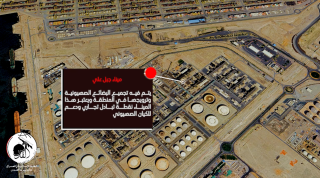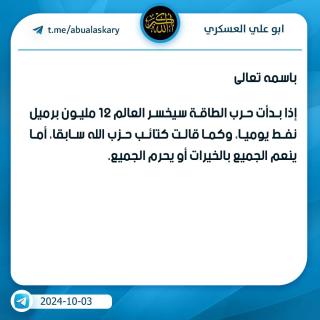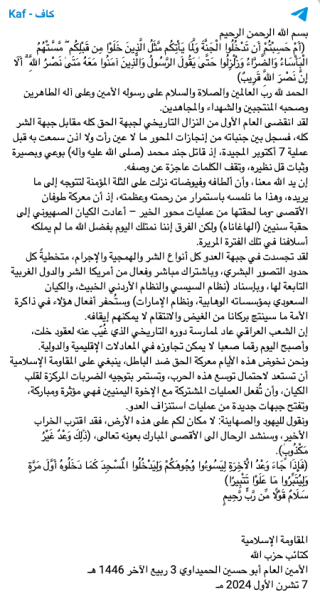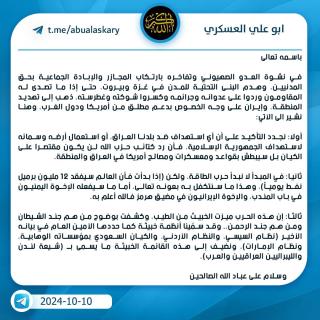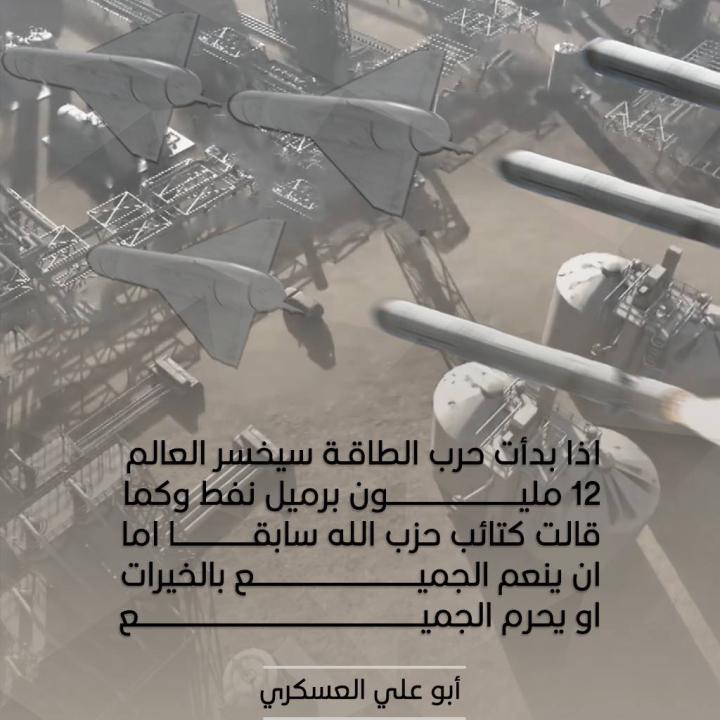
Deciphering Iraqi Militia Threats of an Energy War

Nujaba and Kataib Hezbollah have warned they will attack energy facilities in the Gulf and elsewhere, but how serious are these threats?
Since Iran’s October 1 missile attack against Israel, the Iraqi muqawama (resistance) have repeatedly threatened to strike energy infrastructure in the region if Israel targets Iran’s energy sector. To justify such strikes, they have engaged in a smear campaign against certain Arab nations, particularly the United Arab Emirates and Saudi Arabia. This rhetoric aims to frame these countries as complicit in supporting Israel, laying the groundwork to justify possible future strikes against their critical energy assets.
Nujaba and Kataib Sarkhat al-Quds
On October 13, Kataib Sarkhat al-Quds (KSQ)—a group affiliated with the militia Harakat Hezbollah al-Nujaba and formerly known as Ashab al-Kahf—released a video threatening to attack energy infrastructure in several Arab countries. Referring to these locations as “the Arab economic resources that support the bastard Zionist entity,” the video states, “We will have our share in stopping this support and cutting the export [of energy]” (Figure 1). The video also displayed a map showing the following targets:
- Port of Jebel Ali (Dubai)
- "Port of Manama Isa,'" likely referring to Salman Port in Bahrain
- Jordan River Crossing
- Two gas facilities in Saudi Arabia (locations unspecified)
- Aramco gas facility
One day before the video was published, Nadhim al-Saeedi, the head of Nujaba's Executive Council, made similar threats on television, warning that the “Iraqi resistance will strike energy centers if Iranian oil facilities are bombed” (Figure 2).
Kataib Hezbollah
The first Iraqi militia to escalate the "energy war" rhetoric was Kataib Hezbollah (KH). On October 3, KH security chief Abu Ali al-Askari posted a short Telegram message stating, “If the energy war starts, the world will lose 12 million barrels of oil per day. As Kataib Hezbollah previously stated, either everyone will be blessed with prosperity, or everyone will be deprived" (Figure 3).
This threat was followed by a statement from KH secretary-general Abu Hussein al-Hamidawi that included highly charged language against some Arab governments: “All kinds of evil, barbarism, and criminality have been embodied on the enemy front, exceeding all limits of human imagination, with the direct and effective participation of evil America and its affiliated Western countries, and with the support of the Sisi regime, the malicious Jordanian regime, the Saudi entity with its Wahhabi institutions, and the Emirati regime. The actions of these people will be engraved in the memory of the nation, which will produce a volcano of anger and revenge that they cannot stop" (Figure 4).
Subsequently, Askari issued another statement reiterating his threats about an energy war and attacking Arab governments: “In principle, we will not start an energy war, but if it does start, the world will lose 12 million barrels of oil per day, and this is what we will take care of, with God’s help. As for what the Yemeni brothers will do in Bab al-Mandab, and the Iranian brothers in the Strait of Hormuz, God knows best.” He added, "This war distinguished the evil from the good and clearly revealed who are the soldiers of Satan and who are the soldiers of the Most Merciful. We have named the evil regimes as defined by the Secretary-General in his last statement: the Sisi regime, the Jordanian regime, the Saudi entity with its Wahhabi institutions, and the Emirati regime" (Figure 5).
Analysis
KH has mounted strikes on Gulf targets before using its Awliyat al-Waad al-Haq group, which threatened attacks on U.S. bases in the Gulf as recently as October 24, 2023. Attacks have been launched against Gulf energy infrastructure from and through Iraq, for instance against Saudi targets in May and September 2019.
Nujaba and KH are likely making the current threats on behalf of Iran's Islamic Revolutionary Guard Corps-Qods Force (IRGC-QF). Using Iraqi militias is a way of showing the United States and other powers that an Israeli strike on Iran's oil infrastructure could have destabilizing effects, without Iran itself needing to violate the Chinese-brokered nonaggression pact it made with Saudi Arabia last year. In reality, firing drones and cruise missiles from Iraq could cause serious damage to one or two Arab oil sites—though far less than a determined attack from Iran, and at the risk of embarrassing the already weak-looking Iraqi government.

